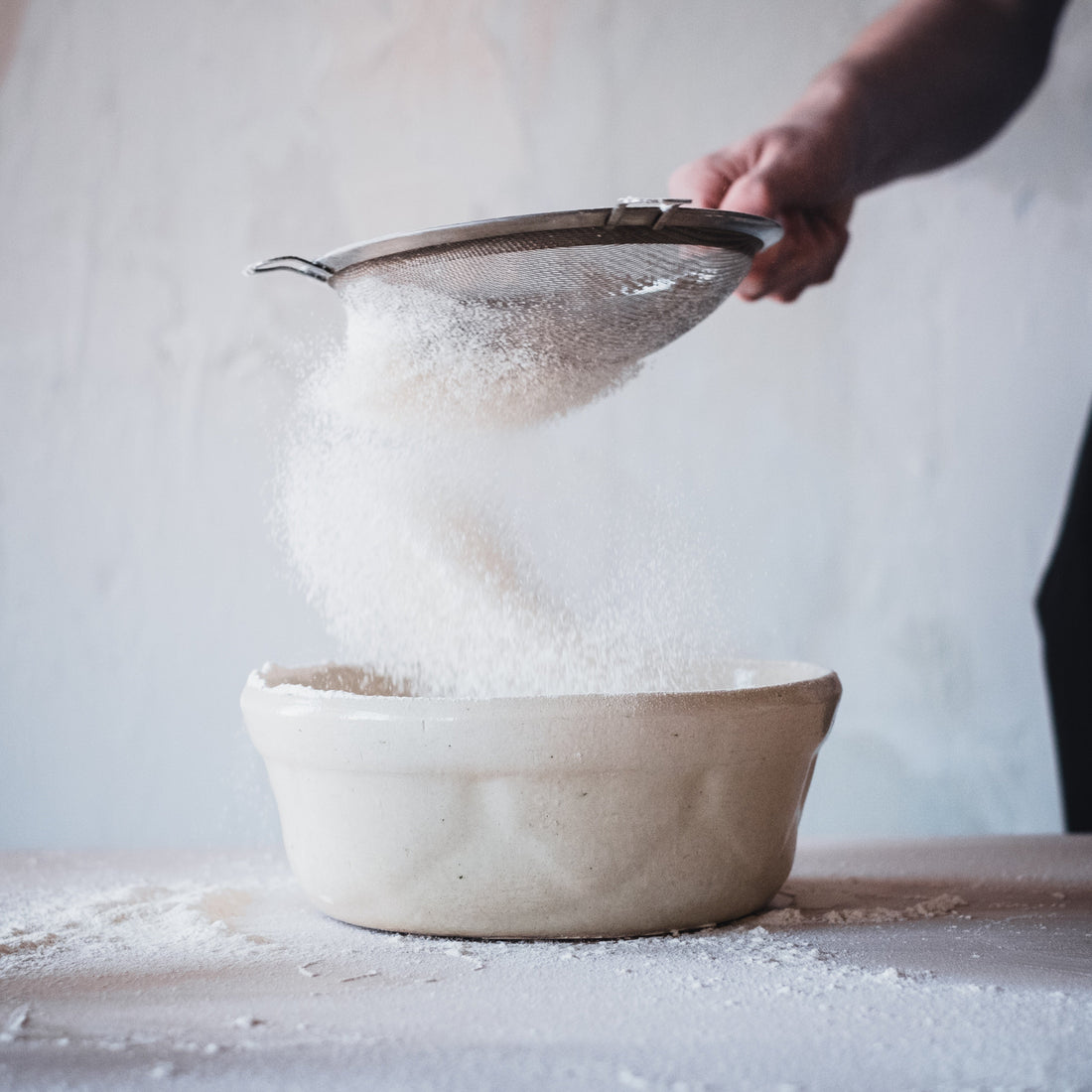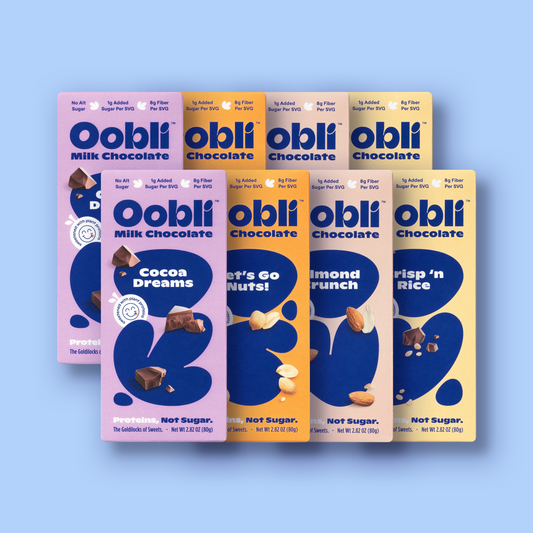Let’s face it, sugar has a pretty bad reputation when it comes to health and well-being. Its high-calorie content and minimal health benefits mean that many health-conscious consumers now try to avoid products with sugar. But are the alternatives any better?
Marketed as a calorie-free sweetening agent, sucralose has found its way into countless products, from diet sodas to sugar-free desserts. But, as the demand for low-calorie sweeteners continues to rise, concerns about their potential effects on our health, particularly on the gut, have grown.
So, is sucralose bad for your gut? What does the research tell us? In this article, we’ll explore the relationship between sucralose and gut health, giving you the facts you need to make the smartest, safest, healthiest dietary choices for your body.
Is Sucralose Bad For Your Gut?
So, is sucralose bad for your gut? Does sucralose kill gut bacteria? Let’s break down what we know so far about sucralose and gut health.
The Crucial Role of a Healthy Gut Microbiome
A thriving, diverse gut microbiome is essential for our overall well-being. The human gastrointestinal tract is a bustling ecosystem inhabited by trillions of microorganisms, including bacteria, viruses, fungi, and other microbes.
This community, often referred to as the gut microbiome, plays a crucial role in various bodily functions. It helps digest food, produces essential nutrients, and plays a vital role in our immune system. We’ve got a lot to thank these tiny microorganisms for!
The gut microbiome also plays an important role in other aspects of our health - it’s closely linked to our metabolic health, mental well-being, and even weight regulation. Any disturbance in the delicate balance of the gut microbiome can lead to multiple downstream health issues.
That’s why it’s so important to determine whether sucralose kills gut bacteria - any small disruption to our gut microbiome can cause all kinds of issues to our overall well-being.
Does Sucralose Kill Gut Bacteria?
So, does sucralose kill gut bacteria? There’s some conflicting research on whether sucralose kills gut bacteria, but it does appear that sucralose can disrupt the balance of gut bacteria. Some studies show that even consuming sucralose at levels thought to be safe causes changes in gut bacteria.
As we mentioned, any disruption to the gut’s delicate microbiome can have serious consequences. Sucralose gut problems can lead to chronic inflammation and the potential development of a wide range of diseases, including type 2 diabetes.
How Sucralose May Impact Gut Lining and Immunity
Sucralose gut problems extend beyond sucralose and gut bacteria. Sucralose may also influence the gut lining, which serves as a barrier between the interior of the body and the external environment, preventing the entry of harmful substances and pathogens.
Emerging research suggests that artificial sweeteners like sucralose can weaken this protective barrier and cause “leaky gut syndrome.” This means that toxins, pathogens, and other harmful compounds can escape the gut into the bloodstream, wreaking havoc throughout the body.
So Is Sucralose Bad For Your Gut?
So, is sucralose bad for your gut? It certainly looks that way. There’s more and more evidence to suggest that sucralose can disrupt the delicate gut microbiome, which can lead to a long list of downstream health issues.
Plus, sucralose can also affect the integrity of the gut’s lining, causing toxins and other harmful particles to leak into the bloodstream, leading to inflammation and potentially more serious effects.
More Reasons to Avoid Sucralose Beyond Gut Health Concerns
Not only is sucralose bad for your gut, but it comes with a disturbing number of other health concerns. Let’s take a look at why sucralose and gut bacteria is just one of the issues you need to be aware of with this harmful sweetener.
Neurological and Psychological Effects
Alarmingly, there are links between sucralose and neurological effects. As well as the typical sucralose headache that many people experience, this sweetener may also cause changes in mood or cognition, and has caused depression in studies using mice.
Endocrine and Metabolic Disruptions
Sucralose's impact on the endocrine system and metabolic processes has also come under scrutiny. The endocrine system, which regulates hormone production and release, is vital for maintaining overall health and balance within the body.
Some studies have suggested that sucralose can interfere with hormonal regulation, potentially affecting metabolic health. This includes concerns about how these sweeteners may influence insulin sensitivity, glucose regulation, and energy metabolism.
While it was originally thought that sucralose didn’t affect insulin levels or sugar metabolism, new research has challenged that, which has severe implications for anyone on a sucralose keto diet - sucralose may not be as keto-friendly as we once thought.
Allergies and Intolerances
Some people may also experience sucralose intolerance, which may cause a skin rash, digestive discomfort, or other allergic symptoms. While switching to a different sweetener might seem like a good solution, you’ll find that the side effects of erythritol are very similar to sucralose vs aspartame.
Speaking of aspartame, does aspartame cause inflammation? Yes - like other sweeteners, aspartame can cause short-term and, potentially, chronic inflammation, which can lead to serious diseases like type 2 diabetes or arthritis. This is the reason many people detox from aspartame.
Are there any other sweeteners that aren’t bad for your gut, or health in general? Unfortunately, because our bodies aren’t used to consuming artificial sweeteners, they all tend to come with side effects and health issues, including potential problems with stevia and pregnancy.
So, if sucralose kills gut bacteria, and all sweeteners have their own health risks, what should you look for as a safe alternative? Luckily, we have the answer right here - Oobli!
A Better Way to Satisfy Your Sweet Tooth: Oobli
At Oobli, we sweeten things a little differently. By harnessing the power of natural, potent sweet proteins, we can bring you treats that are full of flavor and free from guilt! Oobli’s delicious, low-sugar alternatives use natural sweet proteins, avoiding all the health risks of artificial sweeteners.
What Are Sweet Proteins?
If you’re new to the sweet protein game, here’s what you need to know. Sweet proteins are incredible proteins that are found naturally in many exotic fruits. They can be up to 5,000 times sweeter than sugar, meaning that only a tiny amount is needed to sweeten your favorite snack.
Some of the benefits of sweet proteins are that they are a low-calorie, natural alternative to sugar and artificial sweeteners. They also don’t come with the horrible aftertaste that many sweeteners have (we all know that stevia tastes bad) - just a guilt-free, sweet punch!
Can sweet proteins be used as a sugar substitute? Absolutely! At Oobli, we use sweet proteins as a healthy, natural sweetener to create the best sugar free drinks and chocolate bars.
How are sweet proteins made? At Oobli, we use precision fermentation protein. This gives us natural sweet proteins in bulk, using a process that’s similar to how cheese, wine, and beer are made.
Taste and Feel the Difference Today!
Now that you know the effect of sucralose on the gut, and the potential health risks that come with other artificial sweeteners, it makes sense to search for drinks without aspartame and other sweeteners. At Oobli, that’s our specialty!
Our quenching, fruity, low sugar tea is a natural, delicious alternative to nasty diet beverages that do more harm than good. With just 7g of sugar in each 16oz can, you’ll be amazed with every tasty sip that this beverage is actually good for you!
Is chocolate more your style? Our decadent dark chocolate bars are vegan, keto-friendly, high in fiber, and contain just a handful of ingredients that probably already exist in your pantry. If you’re ready to opt out of sucralose gut problems, make the switch to Oobli!
Parting Thoughts on Sucralose and Gut Health
As you can see, there are some alarming links between sucralose and gut bacteria. As well as disrupting our delicate microbiome, the effect of sucralose on the gut can also affect the integrity of our gut lining, causing intestinal irritation and inflammation.
The good news is that you can avoid the effect of sucralose on the gut by switching to Oobli! Our delicious treats are sweetened with natural sweet proteins, making them a safer, healthier alternative to artificial sweeteners.
Ready to enjoy your favorite treats, without the gut issues? Switch to Oobli and taste the difference!




